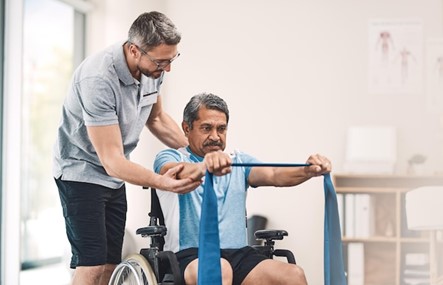It plays a crucial role in stroke recovery, helping individuals regain movement, strength, and independence. This blog explores the benefits, techniques, and stages of physiotherapy tailored for stroke survivors.
Benefits of Physiotherapy:
- Restoring Mobility: Physiotherapists work to improve mobility in affected limbs and overall body movement impaired by stroke.
- Improving Strength: Through targeted exercises, physiotherapy helps strengthen weakened muscles, aiding in balance and stability.
- Enhancing Independence: By focusing on functional tasks like walking, dressing, and self-care, physiotherapy promotes independence in daily activities.
Stages of Physiotherapy:
- Early Rehabilitation: Begins shortly after stroke to prevent complications and start basic mobility exercises and positioning to minimize muscle stiffness and contractures.
- Intermediate Rehabilitation: Focuses on more intensive exercises to improve coordination, balance, and gait patterns, often involving assisted walking devices and specialized equipment.
- Advanced Rehabilitation: Continues to build strength, endurance, and fine motor skills, incorporating complex movements and activities tailored to individual recovery goals.
Techniques Used in Physiotherapy:
- Neurodevelopmental Techniques (NDT): Focuses on facilitating normal movement patterns and improving motor control through hands-on therapeutic techniques.
- Constraint-Induced Movement Therapy (CIMT): Involves restricting movement of the unaffected limb to encourage use and strength development in the affected limb.
- Task-Specific Training: Involves repetitive practice of everyday tasks to enhance functional abilities and promote neuroplasticity.
- Electrical Stimulation: Uses electrical currents to stimulate muscles and improve muscle tone and strength in affected limbs.
Home Exercise Programs:
- Physiotherapists design personalized exercise programs for stroke survivors to continue rehabilitation at home, focusing on maintaining gains achieved in therapy sessions.
- These programs help reinforce skills learned during therapy and encourage ongoing progress in mobility and function.
Importance of Continual Support:
Stroke recovery is a lifelong journey, requiring ongoing support from physiotherapists, caregivers, and community resources. Regular follow-up appointments with physiotherapists help monitor progress, adjust treatment plans, and address new challenges as they arise.
Physiotherapy is instrumental in stroke recovery, offering tailored interventions to improve mobility, strength, and quality of life. By focusing on early intervention, targeted exercises, and ongoing support, physiotherapy empowers stroke survivors to achieve optimal functional outcomes and regain independence in daily living
